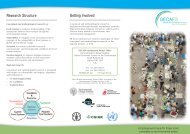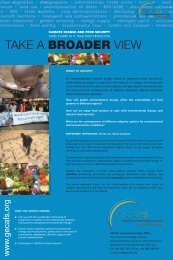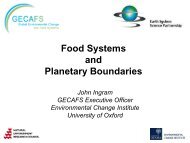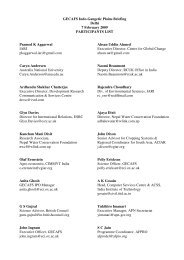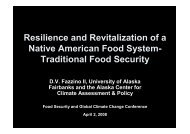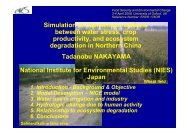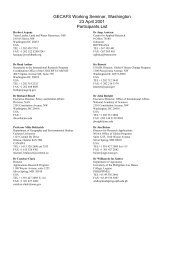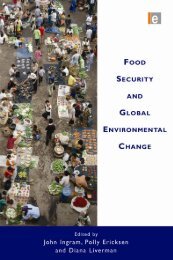From Food Production to Food Security - Global Environmental ...
From Food Production to Food Security - Global Environmental ...
From Food Production to Food Security - Global Environmental ...
- No tags were found...
You also want an ePaper? Increase the reach of your titles
YUMPU automatically turns print PDFs into web optimized ePapers that Google loves.
Third, and of considerable practical relevance, GEC research is usually thought of as thepurview of agencies responsible for science and/or environment, whereas food securityresearch is usually thought of in terms of agriculture or aid agencies. Bringing these twogroups <strong>to</strong>gether, and finding a common agenda which appeals <strong>to</strong> their respective governanceand donor policies, is far from easy, especially as the funders and government structures thatsupport the respective research communities are not traditional collabora<strong>to</strong>rs. An encouragingdevelopment is that the international development and national security communities are nowinterested in becoming involved in such research, although they have limited ability <strong>to</strong> fundresearch without an immediate agenda for action. Within the GEC community, the ‘<strong>Global</strong>Change SysTem for Analysis, Research and Training’ (START) and GECAFS have both hadsome success on this front, while the emerging CGIAR (Consultative Group on InternationalAgricultural Research) agenda ‘Climate Change, Agriculture and <strong>Food</strong> <strong>Security</strong>’, has manyaspects specifically designed <strong>to</strong> do this (CCAFS, 2009).So who sets the GEC–food security research agenda, and how?Given the points made above, the ‘who’ is ideally the regional stakeholder community atlarge (policy advisors/makers, resource managers, researchers, NGOs donors, etc.); and the‘how’ is preferably by working interactively <strong>to</strong>gether, developing a shared vision andcommon understanding, and engendering trust. With such a broad stakeholder communitythis begs the question of how this engagement is managed, and by whom? Clearly it takestime, money and commitment, and may well result in an agenda that none of the participantsanticipated. Further, the agenda-setting process needs <strong>to</strong> be flexible <strong>to</strong> inputs from scienceand policy developments as they emerge. This allows the agenda <strong>to</strong> encompass latestthinking, and also engenders the buy-in of a wider group (geographical and/or thematic) ofstakeholders. There may also be a particular need <strong>to</strong> integrate the business sec<strong>to</strong>r and/orNGOs, and this particular dynamic is discussed in Box 4.Some final points warrant stressing when designing and undertaking research which seeks <strong>to</strong>influence policy. It is crucial <strong>to</strong> establish the information needs of the policy process early inresearch planning, and <strong>to</strong> develop the research programme accordingly. Further aspects ofparticular relevance <strong>to</strong> the science-policy debate are the requirement <strong>to</strong>: (i) establish andmaintain credibility with all stakeholders; (ii) achieve practicality; (iii) demonstrateusefulness <strong>to</strong> the designated beneficiaries; (iv) provide information <strong>to</strong> end-users in a timelyand accessible format; and (v) ensure acceptability by end-users (Ingram et al., 2007a).All these aspects will benefit from a carefully designed stakeholder engagement processwhich gives all stakeholders a sense of participation in, and joint-ownership of, the researchprocess. Finally, and although a number of options have been presented above, it is important<strong>to</strong> appreciate that local cus<strong>to</strong>ms and etiquette largely dictate the best way of establishing ‘whoneeds <strong>to</strong> know what’. Local knowledge and people are critically important.72



